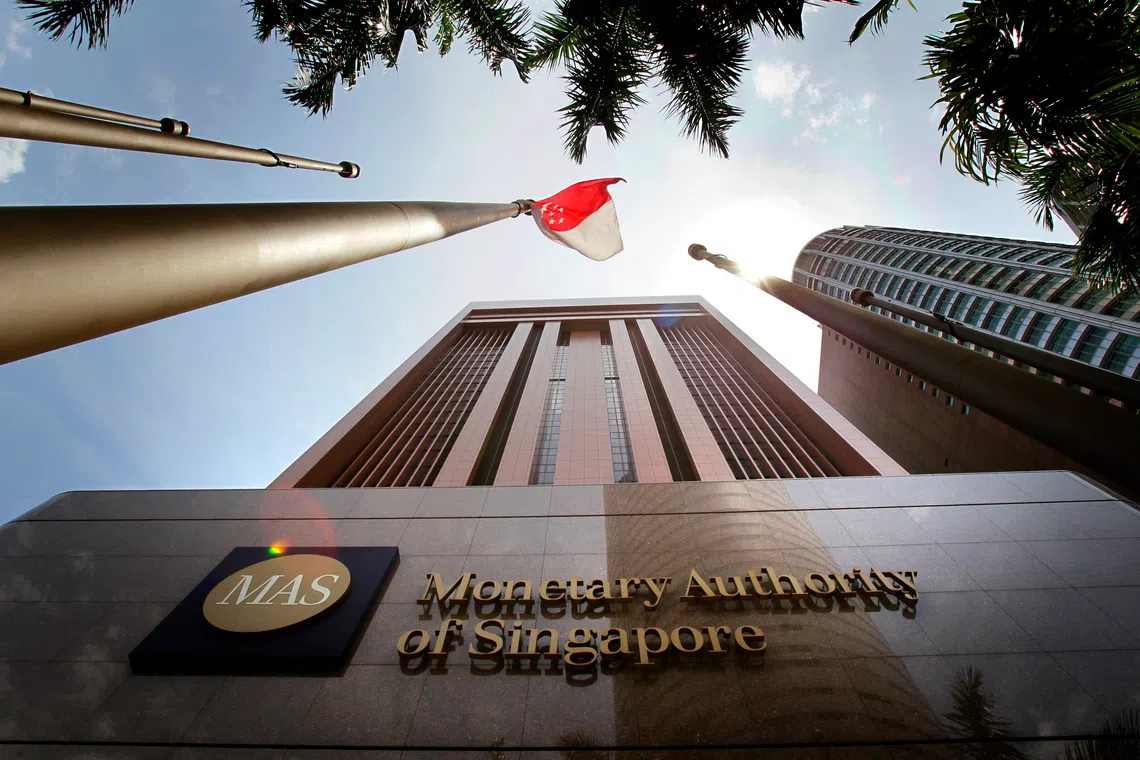Global financial stability risks elevated despite economic resilience: MAS
Sign up now: Get ST's newsletters delivered to your inbox

MAS said “euphoric” stock markets have rebounded to record highs, although the concurrent sharp rise in gold prices suggest some unease.
ST PHOTO: KEVIN LIM
- Singapore's corporates, households, and banks are resilient despite trade and geopolitical challenges, says MAS's financial stability review.
- Corporate debt-servicing improved due to strong earnings, while households benefited from stable incomes and lower mortgage rates.
- MAS warns of global risks like stretched valuations and high debt, urging vigilance and sound risk management for banks and insurers.
AI generated
SINGAPORE - Singapore companies, households and banks have the financial strength to weather shocks to incomes and financing costs, but they have to remain vigilant given the highly uncertain global environment.
Globally, financial stability risks are elevated despite the buoyant sentiment across several financial markets, the central bank said on Nov 5.
The Monetary Authority of Singapore (MAS) said “euphoric” stock markets have rebounded to record highs, although the concurrent sharp rise in gold prices and unconventional movements in the US dollar suggest some unease.
“The continued divergence between equity market valuations and rising downside risks to growth raises the prospects of disorderly corrections in the event of shocks,” MAS said in its annual financial stability review.
MAS noted that much of the rise in equity markets has been driven by a surge in investments related to artificial intelligence (AI), potentially leaving many investors significantly exposed to the tech sector.
Some Big Tech firms – mainly companies that operate huge, global networks of data centres – have used potentially circular private financing arrangements to fund their expansions. These include the use of special purpose vehicles, private credit structures and novel accounting treatments that could mask leverage and increase funding dependencies.
As a result, some AI firms face intensifying pressure to generate sufficient revenue to repay a growing base of public investors and private creditors.
In the sovereign bond markets, there are concerns over fiscal sustainability amid high and rising public debt levels. Recent prominent credit losses involving private credit funds have drawn attention to signs of rising corporate credit risks, which could trigger a reversal of historically low corporate bond spreads, it said.
Against a challenging trade and geopolitical backdrop, companies, households and banks in Singapore have remained resilient over the past year, said MAS.
Singapore’s financial conditions have been mildly supportive, with interest rates and borrowing costs declining amid expansions in credit and money supply, the authority added.
Overall bank credit quality was strong as most corporates benefited from the firmer than expected domestic growth momentum, while households were supported by stable income growth.
The financial position of Singapore companies has strengthened over the past year, despite a surge in uncertainty and market volatility in April, when new tariffs were announced on goods entering the US.
Firms’ debt-servicing capacity has improved alongside resilient corporate earnings and a more accommodative financing environment, MAS said. Strong earnings have also enabled firms to continue to accumulate cash buffers, it added.
Households have remained financially resilient over the past year, supported by firm financial asset growth. Debt-servicing capacity has been healthy, underpinned by stable income growth and lower mortgage rates.
The banking sector, meanwhile, has maintained strong capital and liquidity positions. For the non-bank sector, insurers remained well-capitalised and investment funds managed liquidity risks well.
MAS’ stress tests show that the corporate and household sectors have adequate buffers to manage shocks to incomes and financing costs. Most firms and households are expected to stay resilient under stress, given the current strength of their balance sheets.
However, a small proportion of corporates and households that are more leveraged or have thinner buffers may face debt-servicing pressures and cash flow constraints. In view of the uncertain macroeconomic environment, businesses and households should remain vigilant to downside risks.
The results of MAS’ 2025 stress test for banks and insurers showed they are in a strong position to withstand severe macro-financial shocks. Nevertheless, banks should continue to maintain sound credit risk management practices and adequate provisioning buffers amid the uncertain macroeconomic environment.
MAS warned that risks may manifest as sharp repricing shocks, with the potential to cause spikes in investment fund redemptions or impose capital losses on insurers.
Investment funds should thus continue to monitor liquidity risks, while insurers should remain vigilant and closely monitor their capital and liquidity positions and business strategy risks amid continuing market volatility, it said.



